HIS/HUM 381 Discussion: Natural Resources and Climate Change Analysis
VerifiedAdded on 2022/09/07
|5
|1274
|16
Discussion Board Post
AI Summary
This discussion board post examines three research articles related to natural resources and climate change. The first article, by Schandl et al. (2016), investigates the potential for decoupling environmental pressure and economic growth through policy interventions, analyzing global resource use, energy use, and carbon emissions. The second article, by Williamson et al. (2018), focuses on the importance of behavior change in addressing climate change, identifying human behaviors that contribute to global warming and suggesting actions to reduce emissions and resource dependency. The third article, by Caniglia et al. (2016), explores water policy and governance networks as a means of building resilience to climate change, specifically examining the case of Oklahoma and its water management strategies. Each article is summarized, followed by a reflection on the methodologies and findings, highlighting strengths and weaknesses and suggesting potential improvements. The post also includes references to the original articles.
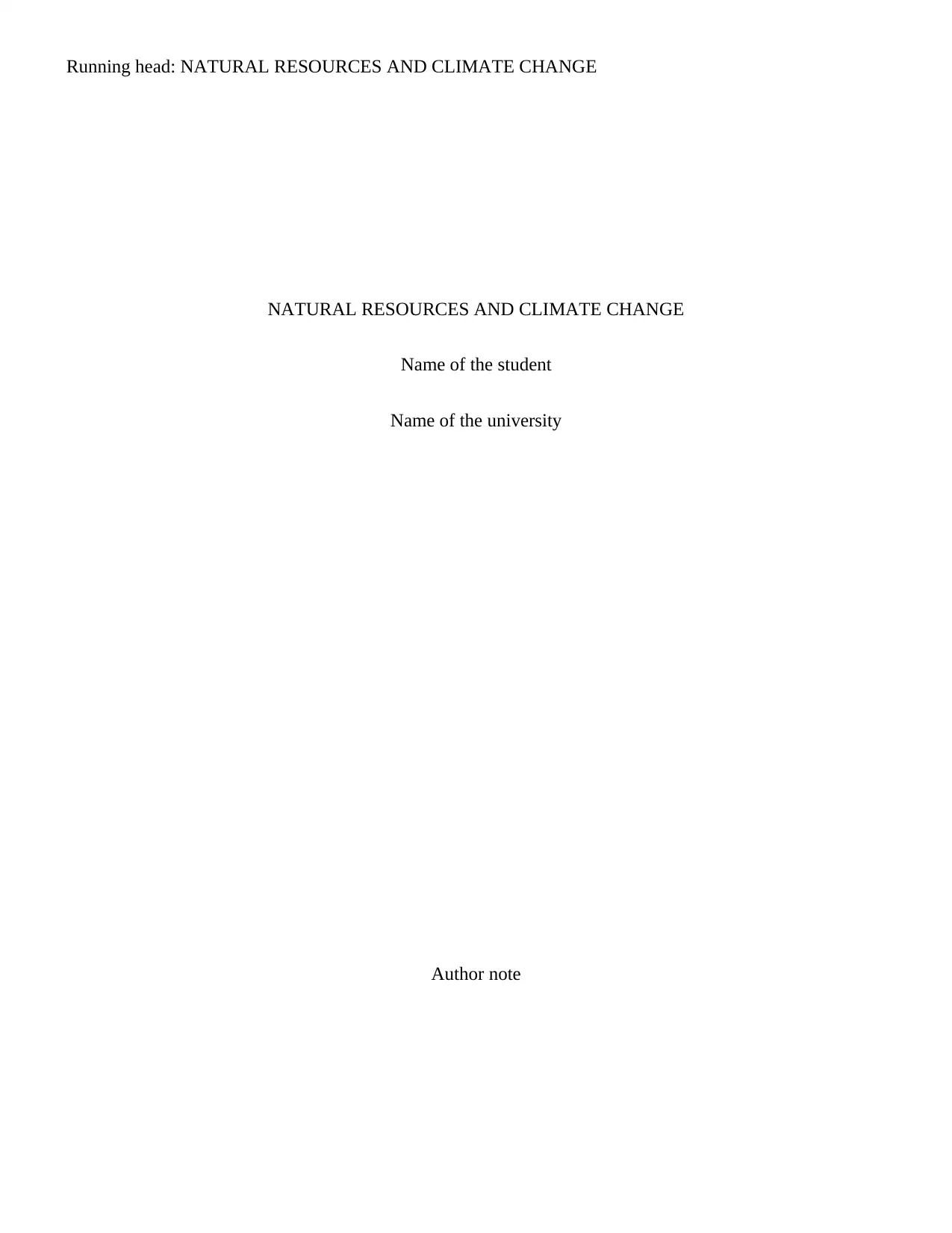
Running head: NATURAL RESOURCES AND CLIMATE CHANGE
NATURAL RESOURCES AND CLIMATE CHANGE
Name of the student
Name of the university
Author note
NATURAL RESOURCES AND CLIMATE CHANGE
Name of the student
Name of the university
Author note
Paraphrase This Document
Need a fresh take? Get an instant paraphrase of this document with our AI Paraphraser
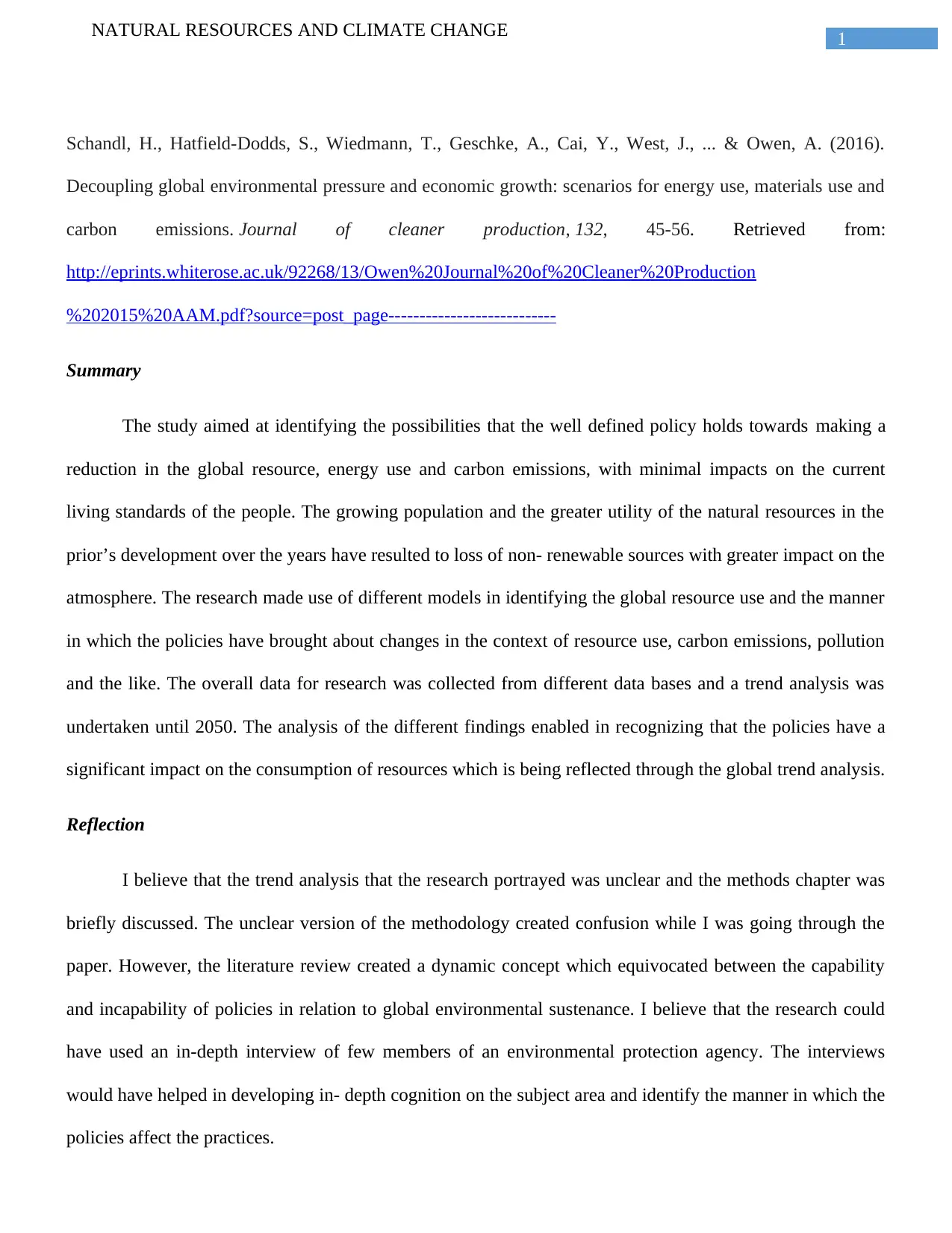
1NATURAL RESOURCES AND CLIMATE CHANGE
Schandl, H., Hatfield-Dodds, S., Wiedmann, T., Geschke, A., Cai, Y., West, J., ... & Owen, A. (2016).
Decoupling global environmental pressure and economic growth: scenarios for energy use, materials use and
carbon emissions. Journal of cleaner production, 132, 45-56. Retrieved from:
http://eprints.whiterose.ac.uk/92268/13/Owen%20Journal%20of%20Cleaner%20Production
%202015%20AAM.pdf?source=post_page---------------------------
Summary
The study aimed at identifying the possibilities that the well defined policy holds towards making a
reduction in the global resource, energy use and carbon emissions, with minimal impacts on the current
living standards of the people. The growing population and the greater utility of the natural resources in the
prior’s development over the years have resulted to loss of non- renewable sources with greater impact on the
atmosphere. The research made use of different models in identifying the global resource use and the manner
in which the policies have brought about changes in the context of resource use, carbon emissions, pollution
and the like. The overall data for research was collected from different data bases and a trend analysis was
undertaken until 2050. The analysis of the different findings enabled in recognizing that the policies have a
significant impact on the consumption of resources which is being reflected through the global trend analysis.
Reflection
I believe that the trend analysis that the research portrayed was unclear and the methods chapter was
briefly discussed. The unclear version of the methodology created confusion while I was going through the
paper. However, the literature review created a dynamic concept which equivocated between the capability
and incapability of policies in relation to global environmental sustenance. I believe that the research could
have used an in-depth interview of few members of an environmental protection agency. The interviews
would have helped in developing in- depth cognition on the subject area and identify the manner in which the
policies affect the practices.
Schandl, H., Hatfield-Dodds, S., Wiedmann, T., Geschke, A., Cai, Y., West, J., ... & Owen, A. (2016).
Decoupling global environmental pressure and economic growth: scenarios for energy use, materials use and
carbon emissions. Journal of cleaner production, 132, 45-56. Retrieved from:
http://eprints.whiterose.ac.uk/92268/13/Owen%20Journal%20of%20Cleaner%20Production
%202015%20AAM.pdf?source=post_page---------------------------
Summary
The study aimed at identifying the possibilities that the well defined policy holds towards making a
reduction in the global resource, energy use and carbon emissions, with minimal impacts on the current
living standards of the people. The growing population and the greater utility of the natural resources in the
prior’s development over the years have resulted to loss of non- renewable sources with greater impact on the
atmosphere. The research made use of different models in identifying the global resource use and the manner
in which the policies have brought about changes in the context of resource use, carbon emissions, pollution
and the like. The overall data for research was collected from different data bases and a trend analysis was
undertaken until 2050. The analysis of the different findings enabled in recognizing that the policies have a
significant impact on the consumption of resources which is being reflected through the global trend analysis.
Reflection
I believe that the trend analysis that the research portrayed was unclear and the methods chapter was
briefly discussed. The unclear version of the methodology created confusion while I was going through the
paper. However, the literature review created a dynamic concept which equivocated between the capability
and incapability of policies in relation to global environmental sustenance. I believe that the research could
have used an in-depth interview of few members of an environmental protection agency. The interviews
would have helped in developing in- depth cognition on the subject area and identify the manner in which the
policies affect the practices.
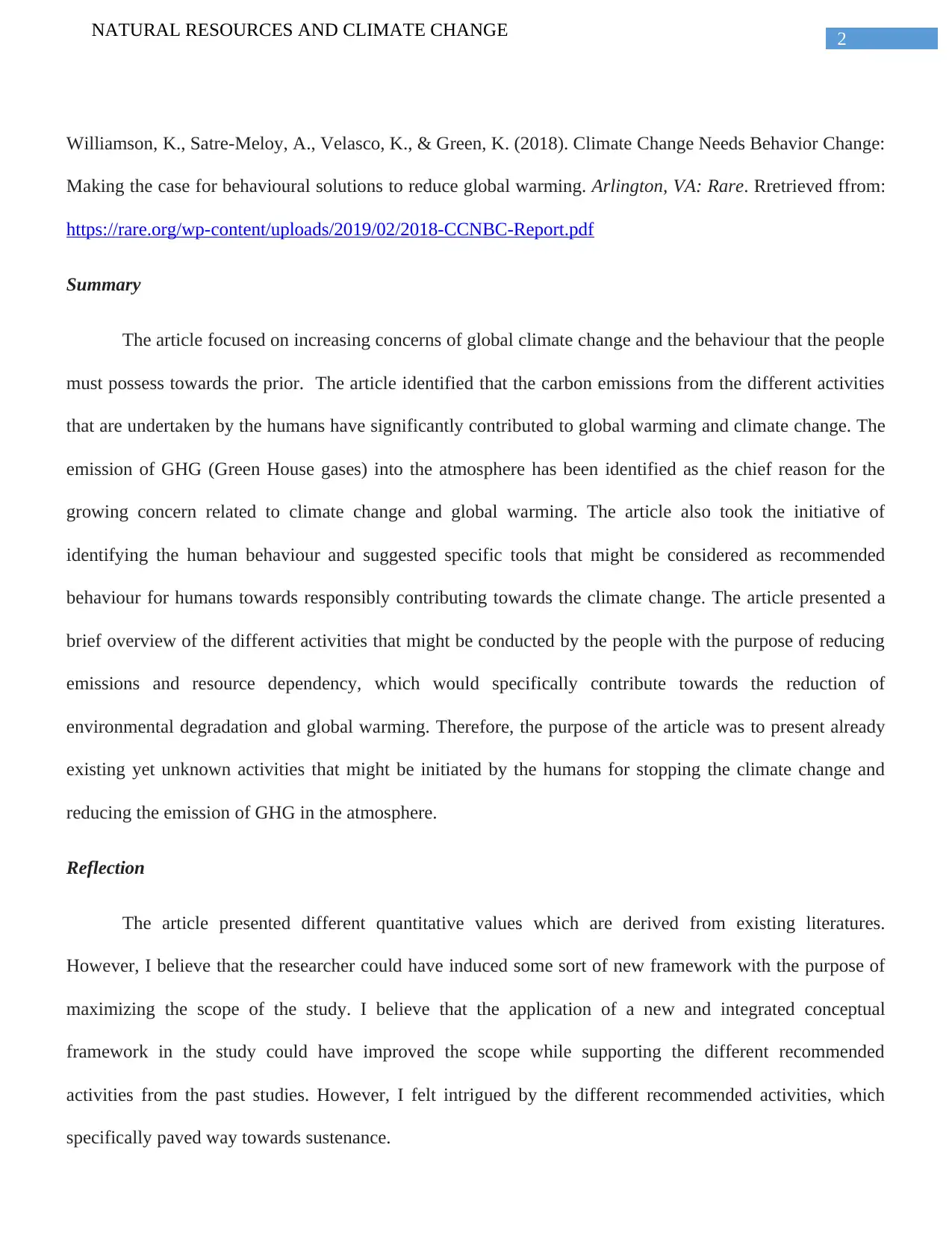
2NATURAL RESOURCES AND CLIMATE CHANGE
Williamson, K., Satre-Meloy, A., Velasco, K., & Green, K. (2018). Climate Change Needs Behavior Change:
Making the case for behavioural solutions to reduce global warming. Arlington, VA: Rare. Rretrieved ffrom:
https://rare.org/wp-content/uploads/2019/02/2018-CCNBC-Report.pdf
Summary
The article focused on increasing concerns of global climate change and the behaviour that the people
must possess towards the prior. The article identified that the carbon emissions from the different activities
that are undertaken by the humans have significantly contributed to global warming and climate change. The
emission of GHG (Green House gases) into the atmosphere has been identified as the chief reason for the
growing concern related to climate change and global warming. The article also took the initiative of
identifying the human behaviour and suggested specific tools that might be considered as recommended
behaviour for humans towards responsibly contributing towards the climate change. The article presented a
brief overview of the different activities that might be conducted by the people with the purpose of reducing
emissions and resource dependency, which would specifically contribute towards the reduction of
environmental degradation and global warming. Therefore, the purpose of the article was to present already
existing yet unknown activities that might be initiated by the humans for stopping the climate change and
reducing the emission of GHG in the atmosphere.
Reflection
The article presented different quantitative values which are derived from existing literatures.
However, I believe that the researcher could have induced some sort of new framework with the purpose of
maximizing the scope of the study. I believe that the application of a new and integrated conceptual
framework in the study could have improved the scope while supporting the different recommended
activities from the past studies. However, I felt intrigued by the different recommended activities, which
specifically paved way towards sustenance.
Williamson, K., Satre-Meloy, A., Velasco, K., & Green, K. (2018). Climate Change Needs Behavior Change:
Making the case for behavioural solutions to reduce global warming. Arlington, VA: Rare. Rretrieved ffrom:
https://rare.org/wp-content/uploads/2019/02/2018-CCNBC-Report.pdf
Summary
The article focused on increasing concerns of global climate change and the behaviour that the people
must possess towards the prior. The article identified that the carbon emissions from the different activities
that are undertaken by the humans have significantly contributed to global warming and climate change. The
emission of GHG (Green House gases) into the atmosphere has been identified as the chief reason for the
growing concern related to climate change and global warming. The article also took the initiative of
identifying the human behaviour and suggested specific tools that might be considered as recommended
behaviour for humans towards responsibly contributing towards the climate change. The article presented a
brief overview of the different activities that might be conducted by the people with the purpose of reducing
emissions and resource dependency, which would specifically contribute towards the reduction of
environmental degradation and global warming. Therefore, the purpose of the article was to present already
existing yet unknown activities that might be initiated by the humans for stopping the climate change and
reducing the emission of GHG in the atmosphere.
Reflection
The article presented different quantitative values which are derived from existing literatures.
However, I believe that the researcher could have induced some sort of new framework with the purpose of
maximizing the scope of the study. I believe that the application of a new and integrated conceptual
framework in the study could have improved the scope while supporting the different recommended
activities from the past studies. However, I felt intrigued by the different recommended activities, which
specifically paved way towards sustenance.
⊘ This is a preview!⊘
Do you want full access?
Subscribe today to unlock all pages.

Trusted by 1+ million students worldwide
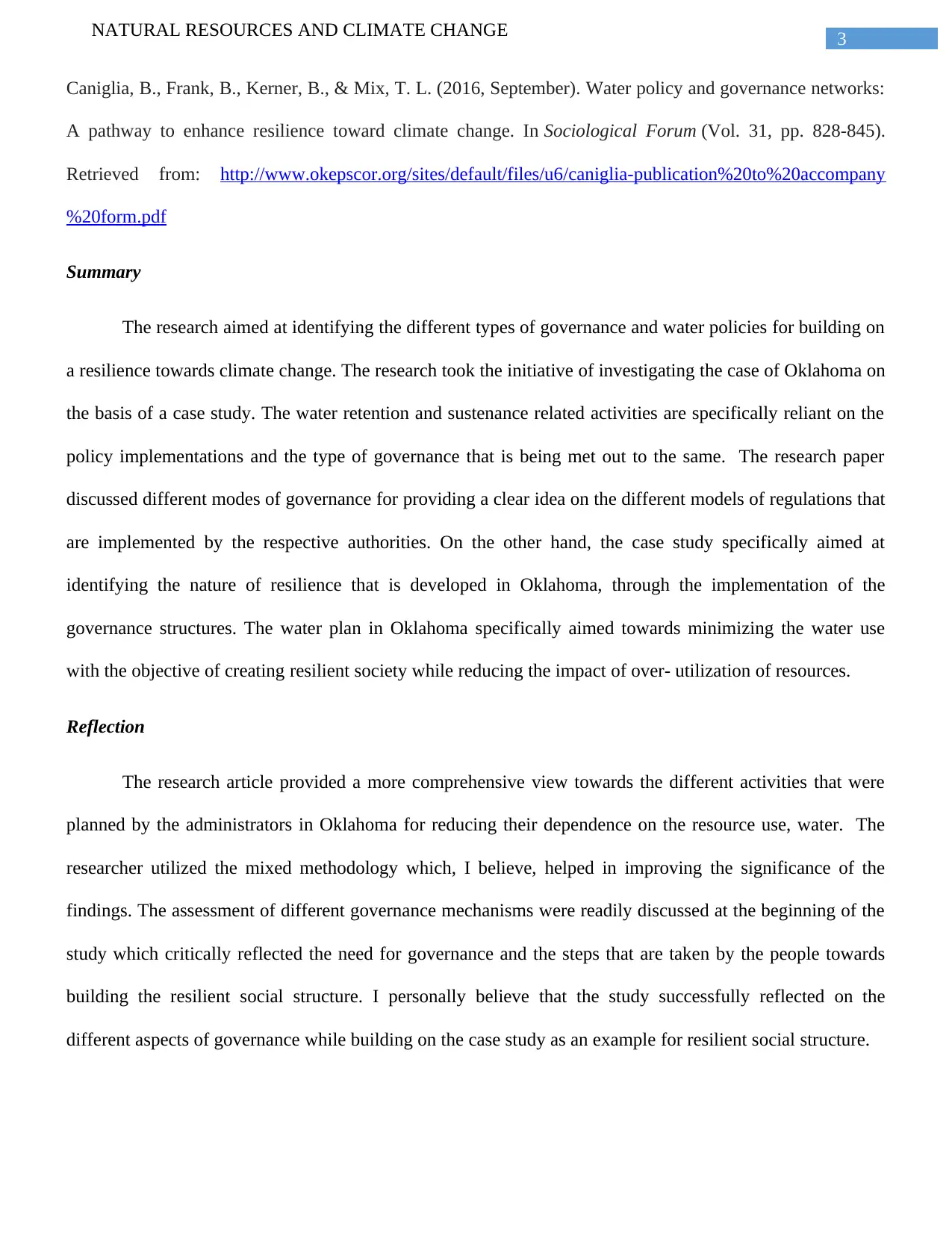
3NATURAL RESOURCES AND CLIMATE CHANGE
Caniglia, B., Frank, B., Kerner, B., & Mix, T. L. (2016, September). Water policy and governance networks:
A pathway to enhance resilience toward climate change. In Sociological Forum (Vol. 31, pp. 828-845).
Retrieved from: http://www.okepscor.org/sites/default/files/u6/caniglia-publication%20to%20accompany
%20form.pdf
Summary
The research aimed at identifying the different types of governance and water policies for building on
a resilience towards climate change. The research took the initiative of investigating the case of Oklahoma on
the basis of a case study. The water retention and sustenance related activities are specifically reliant on the
policy implementations and the type of governance that is being met out to the same. The research paper
discussed different modes of governance for providing a clear idea on the different models of regulations that
are implemented by the respective authorities. On the other hand, the case study specifically aimed at
identifying the nature of resilience that is developed in Oklahoma, through the implementation of the
governance structures. The water plan in Oklahoma specifically aimed towards minimizing the water use
with the objective of creating resilient society while reducing the impact of over- utilization of resources.
Reflection
The research article provided a more comprehensive view towards the different activities that were
planned by the administrators in Oklahoma for reducing their dependence on the resource use, water. The
researcher utilized the mixed methodology which, I believe, helped in improving the significance of the
findings. The assessment of different governance mechanisms were readily discussed at the beginning of the
study which critically reflected the need for governance and the steps that are taken by the people towards
building the resilient social structure. I personally believe that the study successfully reflected on the
different aspects of governance while building on the case study as an example for resilient social structure.
Caniglia, B., Frank, B., Kerner, B., & Mix, T. L. (2016, September). Water policy and governance networks:
A pathway to enhance resilience toward climate change. In Sociological Forum (Vol. 31, pp. 828-845).
Retrieved from: http://www.okepscor.org/sites/default/files/u6/caniglia-publication%20to%20accompany
%20form.pdf
Summary
The research aimed at identifying the different types of governance and water policies for building on
a resilience towards climate change. The research took the initiative of investigating the case of Oklahoma on
the basis of a case study. The water retention and sustenance related activities are specifically reliant on the
policy implementations and the type of governance that is being met out to the same. The research paper
discussed different modes of governance for providing a clear idea on the different models of regulations that
are implemented by the respective authorities. On the other hand, the case study specifically aimed at
identifying the nature of resilience that is developed in Oklahoma, through the implementation of the
governance structures. The water plan in Oklahoma specifically aimed towards minimizing the water use
with the objective of creating resilient society while reducing the impact of over- utilization of resources.
Reflection
The research article provided a more comprehensive view towards the different activities that were
planned by the administrators in Oklahoma for reducing their dependence on the resource use, water. The
researcher utilized the mixed methodology which, I believe, helped in improving the significance of the
findings. The assessment of different governance mechanisms were readily discussed at the beginning of the
study which critically reflected the need for governance and the steps that are taken by the people towards
building the resilient social structure. I personally believe that the study successfully reflected on the
different aspects of governance while building on the case study as an example for resilient social structure.
Paraphrase This Document
Need a fresh take? Get an instant paraphrase of this document with our AI Paraphraser
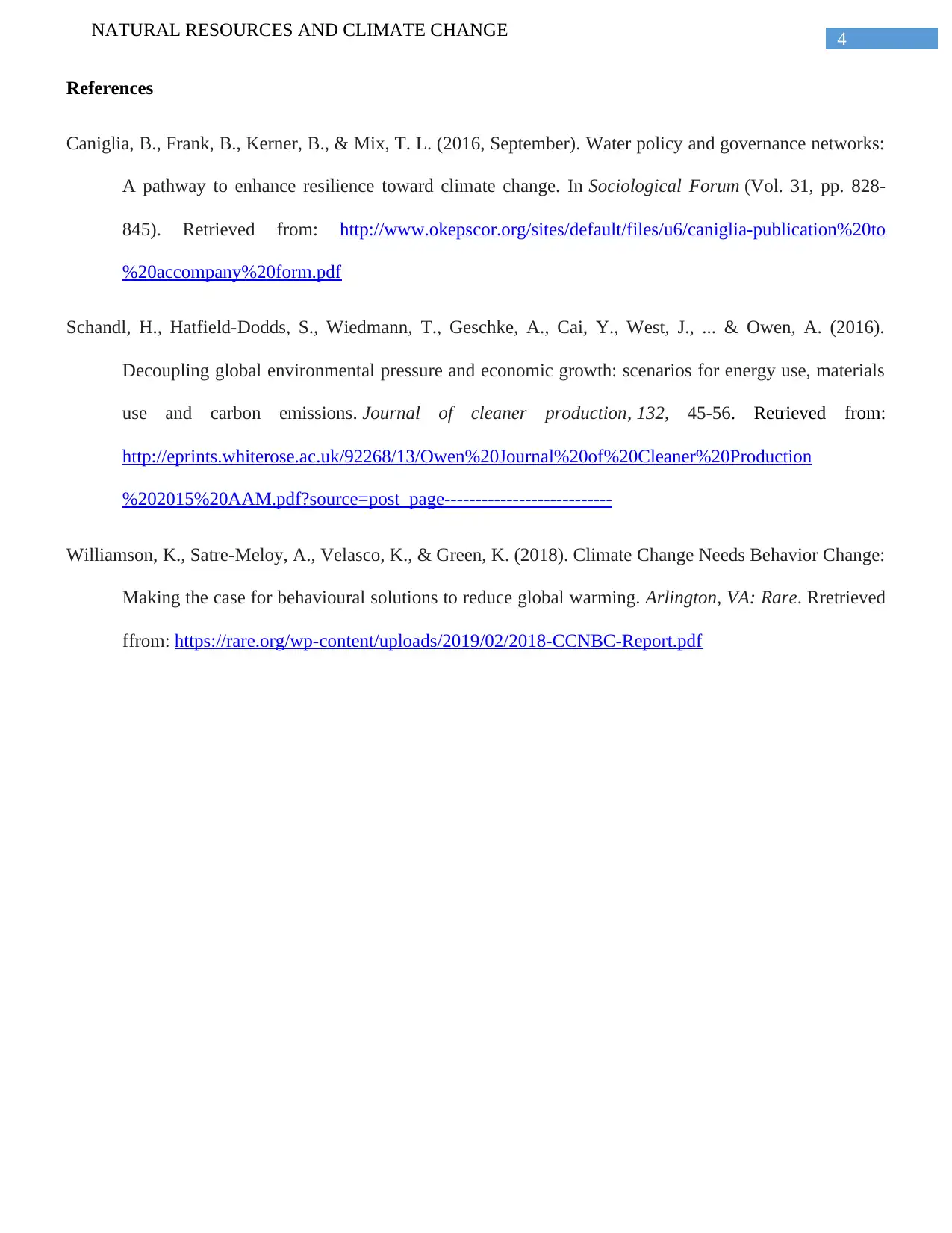
4NATURAL RESOURCES AND CLIMATE CHANGE
References
Caniglia, B., Frank, B., Kerner, B., & Mix, T. L. (2016, September). Water policy and governance networks:
A pathway to enhance resilience toward climate change. In Sociological Forum (Vol. 31, pp. 828-
845). Retrieved from: http://www.okepscor.org/sites/default/files/u6/caniglia-publication%20to
%20accompany%20form.pdf
Schandl, H., Hatfield-Dodds, S., Wiedmann, T., Geschke, A., Cai, Y., West, J., ... & Owen, A. (2016).
Decoupling global environmental pressure and economic growth: scenarios for energy use, materials
use and carbon emissions. Journal of cleaner production, 132, 45-56. Retrieved from:
http://eprints.whiterose.ac.uk/92268/13/Owen%20Journal%20of%20Cleaner%20Production
%202015%20AAM.pdf?source=post_page---------------------------
Williamson, K., Satre-Meloy, A., Velasco, K., & Green, K. (2018). Climate Change Needs Behavior Change:
Making the case for behavioural solutions to reduce global warming. Arlington, VA: Rare. Rretrieved
ffrom: https://rare.org/wp-content/uploads/2019/02/2018-CCNBC-Report.pdf
References
Caniglia, B., Frank, B., Kerner, B., & Mix, T. L. (2016, September). Water policy and governance networks:
A pathway to enhance resilience toward climate change. In Sociological Forum (Vol. 31, pp. 828-
845). Retrieved from: http://www.okepscor.org/sites/default/files/u6/caniglia-publication%20to
%20accompany%20form.pdf
Schandl, H., Hatfield-Dodds, S., Wiedmann, T., Geschke, A., Cai, Y., West, J., ... & Owen, A. (2016).
Decoupling global environmental pressure and economic growth: scenarios for energy use, materials
use and carbon emissions. Journal of cleaner production, 132, 45-56. Retrieved from:
http://eprints.whiterose.ac.uk/92268/13/Owen%20Journal%20of%20Cleaner%20Production
%202015%20AAM.pdf?source=post_page---------------------------
Williamson, K., Satre-Meloy, A., Velasco, K., & Green, K. (2018). Climate Change Needs Behavior Change:
Making the case for behavioural solutions to reduce global warming. Arlington, VA: Rare. Rretrieved
ffrom: https://rare.org/wp-content/uploads/2019/02/2018-CCNBC-Report.pdf
1 out of 5
Related Documents
Your All-in-One AI-Powered Toolkit for Academic Success.
+13062052269
info@desklib.com
Available 24*7 on WhatsApp / Email
![[object Object]](/_next/static/media/star-bottom.7253800d.svg)
Unlock your academic potential
Copyright © 2020–2026 A2Z Services. All Rights Reserved. Developed and managed by ZUCOL.



